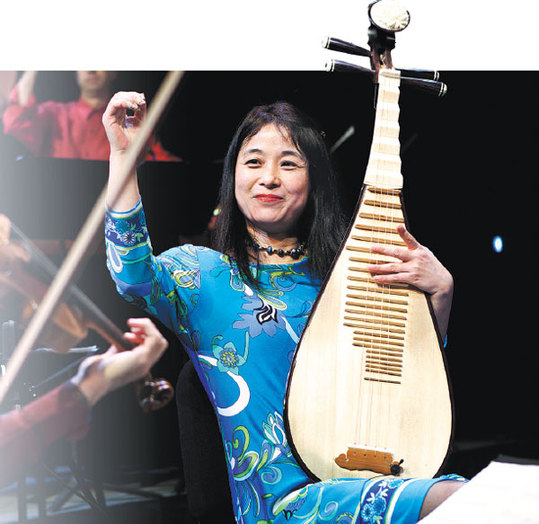Love of the lute
By Chen Nan (China Daily) Updated: 2017-02-07 07:26Pipa player Wu Man moved overseas to promote the Chinese instrument. Now, she hopes to do the same in her homeland. Chen Nan reports.
Wu Man is regarded as the ambassador of the Chinese pipa to the West.
The woman born in Hangzhou, Zhejiang's provincial capital, and based in San Diego has performed extensively overseas over the past decades.
She has imbued the 2,000-year-old, four-stringed Chinese lute with a contemporary vim, infusing it into a variety of genres - jazz, rock and electronic music. That's not to mention performing with symphony orchestras, contemporary dance and theater productions.
Her excellence has earned her five Grammy nominations.
Wu says Westerners often ask: "What is Chinese music?" and "What is the pipa?"
"These (initially) seemed to be simple questions, because I've played since childhood. But when I thought about it carefully, I didn't really know the answer," the 53-year-old explains.
She has been working with such musicians as cellist Yo-Yo Ma and American composer Philip Glass. She has recorded for movie soundtracks, including Ang Lee's The Wedding Banquet and DreamWorks' Kung Fu Panda 3.
"If you're in the market for a guided introduction to the pipa, you could hardly ask for a more virtuosic or enchanting instructor than Wu Man," writes a San Francisco Chronicle reviewer about Wu's solo recital in Berkeley in 2014.
She began regularly returning to China since 2008 for her Borderlands project, which seeks to explore the instrument's origins.
This mission brought Wu to the Xinjiang Uygur autonomous region, Shaanxi province and Central Asia, where the instrument originated along the Silk Road - the ancient trade route that once linked Europe and Asia.
Her research has also been accompanied by tours with musician friends, funded by the Aga Khan Music Initiative in Central Asia, over the past six years. She and these musicians released the album Borderlands: Wu Man and Master Musicians from the Silk Route in 2012.
She plans to bring the project back to China for the first time since with a 12-city, 22-day tour that will start in Shaanxi's capital,Xi'an, in May. Wu will then continue on to such cities as Shenyang, Dalian, Beijing, Suzhou and Wuhan.
She will be joined on the tour by tanbur virtuoso Siro-jiddin Juraev from Tajikistan, Bishkek-based komuz player and composer Askat Jetigen Uulu, and Italian percussionist Andrea Piccioni.
Wu met Juraev 15 years ago, when they were performing on the Silk Road Project that Yo-Yo Ma initiated in 1998.
She met Piccioni in 2016 while performing in Geneva. The upcoming tour will be the first time she is working with Uulu,who is in his early 20s.
"I want to present musicians from different countries and generations. They're great contributors to world music, and I believe Chinese audiences will be enchanted by their songs and instruments," says Wu.
Improvisation is a crucial component of Wu's performances.Her upcoming tour will feature jam sessions based on folk music from China and the other musicians' homelands.
She hopes the shows will also give Chinese a new understanding of the pipa - an instrument she says embodies a "Chinese sound".
"We're so familiar with it that we take its beauty for granted. Sometimes, our understanding of, and imagination about, it is too limited."
Wu set out on the Borderlands project to expand her musical vocabulary. But over the years she found spreading pipa culture became a primary responsibility.
"I was not only able to discover the roots of the pipa but also mine as a Chinese musician."
She began studying the instrument at age 9 and was enrolled at the Central Conservatory of Music in Beijing at 13.
She later became the country's first recipient of a master's degree in pipa at the conservatory.
She moved to the United States in 1990 to discover new sounds for her instrument.
Two years later, she performed with the US string quartet, the Kronos Quartet. The group's founding violinist, David Harrington, says he"heard all sorts of possibilities in Wu Man's vivid pipa sound".
In 1995, they again partnered to perform Chinese composer Tan Dun's Ghost Opera at the Brooklyn Academy of Music.
"To a Western ear, the pipa may sound exotic. People will praise my technique, touch the strings and ask a few questions. But I want more. I want them to feel inspired and influenced, and to return to learn more," says Wu.
"Its presentations are admired for high tones and dazzling technical capacity. But those are only small parts of its totality."
Wu considers education an important mission and works as a professor at conservatories in Beijing, Shanghai and Zhejiang province.
"I left China to discover new dimensions of the pipa and introduce it to the West. Now, I want to realize that vision in China."
Contact the writer at chennan@chinadaily.com.cn

- 'Cooperation is complementary'
- Worldwide manhunt nets 50th fugitive
- China-Japan meet seeks cooperation
- Agency ensuring natural gas supply
- Global manhunt sees China catch its 50th fugitive
- Call for 'Red Boat Spirit' a noble goal, official says
- China 'open to world' of foreign talent
- Free trade studies agreed on as Li meets with Canadian PM Trudeau
- Emojis on austerity rules from top anti-graft authority go viral
- Xi: All aboard internet express











